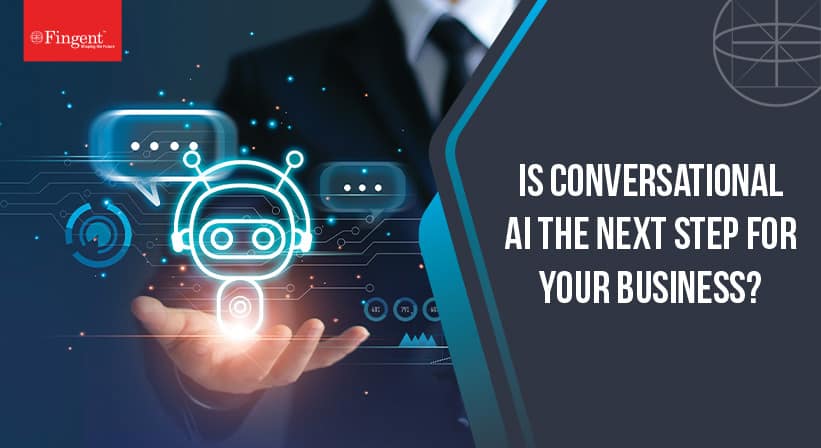Re-imagining Your Business with AI: A Complete Guide For Successful Implementation!
From the mundane to breathtaking, AI is disrupting virtually every business process in all sectors. People are ceasing to associate Artificial Intelligence with science-fiction dystopias as Artificial Intelligence (AI) is taking more commonplace in our daily lives. While such acceptance in mainstream society is a new phenomenon, it is not a new concept in business. Today, AI has become imperative to maintain a competitive edge.
This guide will help business owners who are serious about maintaining a competitive edge in their business sector by adopting AI.
Rising Need for Adopting AI In Business
Did you know that 52% of companies accelerated their AI adoption plans after the pandemic? Why?
Artificial Intelligence in business is seen as a supporting tool. It is adept at processing and analyzing a trove of data much faster and more efficiently than a human brain can. Since AI can synthesize courses of action and present them to the human user, businesses can use AI to help investigate the probable consequences of each action. That way, businesses can streamline the decision-making process. This is what makes AI valuable throughout many industries.
Artificial Intelligence is a form of software that can make decisions independently. It can act even in situations not foreseen by programmers. AI has a wider latitude of decision-making capabilities than traditional software – whether it is simply helping visitors or performing a task as complex as monitoring a wind turbine to predict its maintenance.
Read more: Conversational AI: Reimagining Customer Experiences
How To Identify If Your Business Needs AI?
AI software and tools can make business processes much simpler and more effective. Besides, implementing AI in business ensures cybersecurity defense, powers customer service, and more. But how do you know when you must adopt AI in business? Here are a few scenarios:
Scenario 1: Do you need to enhance your customer experience?
Are you struggling to provide your consumers with quick, easy, and personalized solutions? AI-powered digital assistants can help your business resolve customer queries by imitating human conversation. Chatbots are among the most promising trends in customer engagement and customer experience. Perhaps most business owners realize how imperative this AI technology is to their business. Perhaps that is why the chatbot market is set to reach 1.25 billion USD by 2025.
Scenario 2: You know the value of sentimental analysis but do not know how to leverage it.
Businesses use sentimental analysis to monitor and analyze customers’ opinions and emotions from various texts on a website, social media, and product or service comments. Skimming through large amounts of data to churn out customers’ sentiments can be daunting. All thanks to AI-assisted sentiment analysis, you can now quickly understand how your customers feel about your services or products.
Scenario 3: Your business has suffered due to inaccurate forecasting.
Accurate sales forecasting helps businesses predict future sales for long-term business growth. It can also enable the detection of potential problems to avoid them. Implementing AI-based CRM software can help detect how each data element relates to sales performance.
Scenario 4: You have a great online presence but an awful in-store experience.
If that describes your business, it is time to adopt AI to provide the next level of a personalized in-store experience. AI can enable instant access to products or services and contribute to smarter buying decisions.
A Quick Guide to Implementing AI For Your Business
AI applications can be used in many ways depending on organizational needs and the business intelligence (BI) insights derived from the data collected. Here are some tips to explain the steps businesses can take to ensure their implementation is a success:
1. Know your options.
Find out your options and what AI can and cannot do. This will help you decide if you want to add specific AI technology or change the entire app.
2. What is your business goal?
Working on an ‘end-first’ process will help refine the list to select specific features or capabilities that best suit your business goals.
3. Find out how AI can benefit the end-users
This is crucial as it gives you the two main objectives for a successful implementation. Then, choose the software and hardware you need to make this process a reality.
4. Evaluate your internal capabilities
You need to consider if you have enough skilled employees in-house who can manage the process and if you have the budget to outsource it.
5. Choose between building or integrating the system
Remember building an AI system from scratch can take several months. On the other hand, if you choose to use a premade system, your AI partner will help install the software app, train your staff, and fulfill your business needs.
6. Test system
Testing the system for a predetermined time will help you understand if the clients are more satisfied, and if the employees work more efficiently.
7. Choose the right partner
A good AI partner will be clear about the offer, value, and terms of cooperation.
8. Make refinements
After you gather a reasonable amount of data evidencing the success of an AI solution, you can start making refinement changes to the solution.
Watch more: How Artificial Intelligence Can Enhance Your Customer Experience!
Avoid 4 Common Mistakes While Implementing AI
A well-considered plan can lead to success, but a mistake can cost you considerably in terms of time and resources. Here are four common mistakes to watch out for when implementing AI:
- Not applying AI to the right use cases: If AI is incongruous with your business goals, your time and resources will be wasted
- Not diligent in hiring the right talent: Hiring the right AI team is like putting together the right football team that can win. Hire candidates with specialized skill sets and experience that match your business needs.
- Ignoring data: Ensure all teams are responsible for organizing, vetting, and maintaining data.
- Inadequate intervention: Inadequate intervention could result in AI recommendations that hinder business objectives. Hence, ensure interventions are scalable and repeatable.
How Fingent Can Help You With Personalized AI Software Development
Artificial Intelligence is for every future-oriented business. How exactly you will use AI depends on your business goal and how well it was implemented. At Fingent top custom software development company, the AI developers are equipped to design intelligent solutions to help solve your business problems, automate tasks, and improve customer experience.
Our suite of AI solutions includes data capture and processing. Our AI developers are also proficient in analytics, multi-platform integration, and ML solutions.
Let us help you reach your business goal with intelligent AI-driven solutions. Give us a call today.
Stay up to date on what's new

Recommended Posts

05 Dec 2024 B2B
Benefits of Implementing AI Chatbots for Your Business
AI chatbots – do you need them? Think about this: How long would your customer wait to get the answer to a query? How long would it take them to……

03 Jul 2024 Financial Services
AI in Business: Preparing Leaders For The Revolution
AI in Business is a present reality! It’s a building revolution that is all-encompassing and is redefining business operations. You have only two options. Either ride on the crest of……

20 Jun 2024 Healthcare B2B
AI in Healthcare: Enhancing Patient Outcomes and Experience
Artificial Intelligence is a multi-talented assistant and has proven its worth in the healthcare industry. Healthcare organizations have found innumerable ways to use AI, from record maintenance to patient assistance.……

08 May 2024 Financial Services B2B
AI in Financial Services: Use Cases and Applications
Achieving perfection is no easy process. It is not impossible either. It takes a lot of effort and hard work but with the help of Artificial Intelligence, this process can……
Featured Blogs
Stay up to date on
what's new














